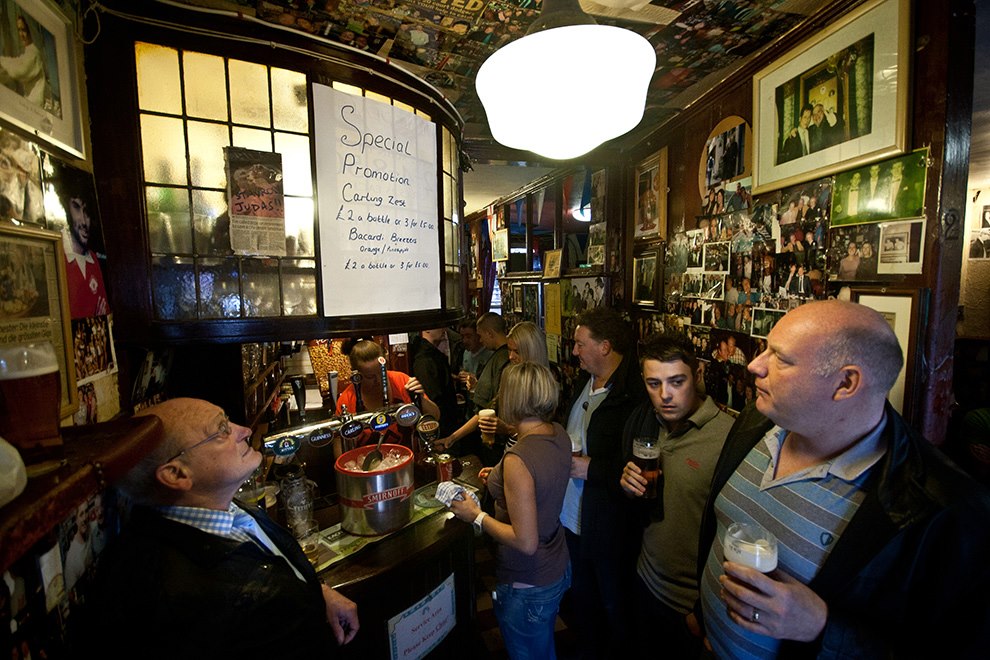I am already late. I think that is what Yule really means: “you are late!” I need to still get a few things together… very few… but I already feel rushed. Perhaps this is how “We Three Kings” felt galloping across the Middle East and it’s all part of the lessons of the season. Fretting. I dunno. I need a few of these Caribbean Christmas drinks. No wonder people take winter vacations. To make up for the Christmas vacation. Not as rushed as the holiday-time photo contest kept me a decade ago. That’s the winner from 2012 up there by Robert Gale, one of 36 photo entries I posted on just one day in that long contest period. That was a lot of fun – but nuts, too.
First up, Stan is back and posted his linkfest on Monday after a month on the hollyjollydays – and he noticed something:
Has it really been four weeks since I posted links here? Indeed, and it seems as if it would be easy to sort through the headlines since Nov. 6 and assemble a post of only stories about the craft beer apocalypse. I am left searching for a phrase that is the opposite of “a rising tide lifts all boats.”
Perhaps “Five Feet And Rising“? Just to, you know, keep up with an aquatic theme? Stan explores some of the reasons for the craft beer predicament so go have a look. Even though the exploration and examination of a downturn is valuable and in craft almost fully ignored… I know the feeling but have promised myself to be cheerier this week. I will. It is the holidays or perhaps just the pre-holidays after all. Let’s see if that’s possible.
But first… Jordan has been worked a few paper rolls through the adding machine and come up with for Ontario what can only be called findings:
Will update the map later, but it looks to me like we’re down from 413 physically operated brewery locations to 389 so far this year. There are some ownership situations I don’t know how to express simply in geographic format. Assume that number is high… If you condense ownership structures, we can reduce 67 locations to 27 companies. So… 349 companies total.
Maybe related: low alcohol partying and no alcohol bars? Apparently Sam Smiths is also running no alcohol bars, given that “as many as 120 Smith’s pubs are currently closed“! That’s what’s said in that article in The Times about the Samuel Smith’s of Yorkshire. Not so much about the brewery as the man running the operation. This was a brutal passage:
Back in the 1990s Samuel Smith’s bought and began pouring millions of pounds into restoring the town’s derelict Old Vicarage, which dates back to the 14th century. Great care was taken to go above and beyond rules stipulated by English Heritage… When the eight-year project was complete, the vicar at the nearby St Mary’s Church was informed that her new house was ready. The offer came like a bolt from the heavens. St Mary’s vicar already had a home — one she liked and better suited the needs of her young family. After the invitation was politely declined, the lavishly restored building was locked up.
Enough. It’s the holidays. Here’s some good news. The BBC reports that Welsh brewery Brains has turned its fortunes around… literally… or is it figuratively…:
The company had debts of £76.4m, most of which had accumulated before the pandemic. Mr Bridge worked with a number of banks to restructure and agree repayment of all of the debt, with the chief executive finally feeling confident about the company’s financial health by the summer of 2023. “We’ve managed to navigate those challenging times. And it wasn’t just us, it was the whole drinks and hospitality industry that went through those challenges,” Mr Bridge said. Brains is more than beer in Wales. Having been brewing in Cardiff since 1882, the company is still owned by the descendants of Samuel Arthur Brain.
More with the cheery. What is cheery? History is cheery! And international. Heck, we received a comment in German this week, a footnote to my bit on the Lispenard clan, 1700s Loyalist beer barons in New York. Lord Goog provided the translation. Speaking of lore of yore, the Beer Ladies Podcast had a great interview this week with Dr Susan Flavin, a historian joined in a project recreating a 1500s brewery:
In this fascinating project – link below – the team used a recipe based on a beer once served in Dublin Castle, in order to not only taste it, but to learn more about the role beer played in the early modern period. This one will tickle the beer history nerds and casual beer fans alike!
In more recent history, Boak and Bailey have a great explainer this week on the pub feature called a “snob screen” as helpfully illustrated in the 1963 comedy The Punch & Judy Man where they are used as part of a physical joke:
Hancock, who co-wrote the film as well as starring in it, uses these as the basis for a bit of ‘business’ which, handily, you can see some of in the trailer for the film. He pops in and out of the various windows, taunting and teasing the snobs behind the snob screen. In other words, he refuses to respect (literal) social barriers, and highlights their purely symbolic nature. After all, he and his pals can hear almost every word that is being said a few inches from them, on the other side of the screen. What is slightly odd is that most surviving examples of tilting or swivelling snob screens are there to separate customers from bar staff, rather than from each other.
Neato. And a couple of decades later, the BBC took us back to a Belfast board game of forty years ago and posed the question whther it was glorifying or just identifying actual pub culture:
1981: Scene Around Six explored a Belfast pub crawl board game, named Binge. Controversial enough that many shops refused to stock it, it did at least have the backing of a certain local mover and shaker, Mr Terri Hooley.
And another bit of history. In the same week that it is reported that Diageo is ditching most of its beer brands*, a landmark in craft brewing history is being lost with the closure of the Ringwood Brewery in Hampshire, England after fifteen years in someone else’s portfolio.
In 2007, Ringwood was purchased by Marston’s for £19.2 million. Marston’s disposed of its brewing operations in 2020, selling assets to a joint venture with the Carlsberg Group to create the Carlsberg Marston’s Brewing Company. Mr Davies mentioned that he is “incredibly proud” of the effort and dedication of staff at Ringwood Brewery, adding: “Our priority now is to support colleagues affected by the proposals through the consultation period, which has now begun.”
You know, the official hagiography of craft beer does not properly account for the importance of the Ringwood Brewery which came into being in 1978 led by Peter Austin. As Boak and Bailey discuss in Brew Britannia as well as in their thoughtful obituary for him of almost a decade ago, Austin was one of the few people who could legitimately be called a founder:
His first triumph was building and getting established the Penrhos Brewery on behalf of Martin Griffiths, Terry ‘Python’ Jones and writer Richard Boston. He then launched his own brewery, Ringwood, in 1978, and thereafter came to be the ‘go to’ guy for advice on setting up similar operations. When David Bruce was setting up his first Firkin brewpub in 1979, it was Austin who vetted his designs for a miniature basement brewkit. The two were both founder members of SIBA, which then stood for The Small Independent Brewers Association, and Austin was its first Chair.
Austin also consulted, with Alan Pugsley, brewing bringing his energy into the new brewing movement in North America. I’ve had beers in breweries in Nova Scotia, Maine, New York and Ontario directly carrying on that tradition. The shutting of the Ringwood is the end of an era.
The big news in the world of Pellicle is that I WON the November fitba pool (even though I am wallowing in the nether ranks.) It which was a great surprise that earned me a mug. Oh… yes, and Will Hawkes wrote something well worth reading for Pellicle about London’s pub group Grace Land and the co-owners Andreas Akerlund and Anselm Chatwin:
They met when Anselm took a job as a bar back at Two Floors, Barworks’ bar in Soho, whilst he was at St Martin’s College (now Central St Martins) in the early 2000s. Temperamentally similar and with a shared passion for music, they cooked up a vague plan to open a dive bar/gig venue—and when a site, formerly The Camden Tup, came on the market in 2009 they opened the first Grace Land venue, The Black Heart. It wasn’t an immediate success. “The Black Heart was a dismal failure for many years,” he says. “But it’s about working with the concept, sticking with it. People get it now.” That philosophy has served them well in the years since, during which they’ve slowly accrued a small family of high-quality pubs…
Note: The English are coming back down to pre-Covid levels of alcohol consumption. Is inflation healthy? Hmm… and while we are at it… next time someone suggests that terrior in wine isn’t real, mention this study as reported in The New York Times:
“It’s one of those terms that the wine industry likes to keep a bit mysterious, part of the magic of wine,” said Alex Pouget, a computational neuroscientist at the University of Geneva. Dr. Pouget is trying to apply chemical precision to this je ne sais quoi. In a study published Tuesday in the journal Communications Chemistry, he and his colleagues described a computer model that could pinpoint which Bordeaux estate produced a wine based only on its chemical makeup. The model also predicted the year in which the wine was made, known as its vintage, with about 50 percent accuracy.
That’s some science right there, that is. Continuing with questions of authenticity, again we go with The Times out of London which had an interesting article on tea and chai this week with some very interesting assertions about appropriation and the nature of foodways:
You can culturally appropriate badly, or you can culturally appropriate well, but almost all culture involves appropriation. While Indians have been adding spices to milky beverages for centuries, the spiced tea that is fashionable in American and British coffee shops, and is sometimes marketed as an exotic drink, is no more purely Indian than, say, chillis (which originally came from Central/South America). Indeed, chai is the result of the British imperial push to get Indians to consume tea.
Note: Lars wrote about complexes of closely located language families. Nicely done. Also nicely done, Geoff wrote about Ethiopian borde over on Mastodon, a very complex form of beer making.
I think I first had Jack’s Abbey lager with Ron and Craig in Albany New York back in March 2016. I recall hitting a store on the way back from Delmar. Ah, Delmar! Anyway, Jeff has done an admirable job remembering what he wrote down during his recent visit… before he lost his notes from that visit… including, to begin, its location:
The city proper is small and compact, but the metro area, or Greater Boston, includes around a hundred small towns clustered in the fan stretching out from Boston Harbor. Two radial freeways, I-95 and I-495, mark important distance metrics. Anything inside I-95 is pretty Boston-y, while anything within the larger I-495 ring is Greater Boston. Framingham, home to Jack’s Abby, is 20 miles due west of downtown Boston and about halfway between 95 and 495.
Note: Zak Rotello of the Olympic Tavern of Rockford, Illinois alerted us to this situation: 1, 2, 3, 4. Govern yourselves accordingly.
Nice piece in Cider Review this week on the state of the tiny German perry trade and its advocate in chief, Barry Masterson:
As anyone who follows Barry will know, there are a good number of pear trees in his home region around Schefflenz. He’s previously reported its former significance in Bavaria and until relatively recently it was a central cultural tenet of rural life in the Western Palatinate, a little way west of Barry, near the Rhine and around much of German wine country. But today there’s vanishingly little to be had commercially, and if I didn’t have a direct line to Barry, Lord alone knows how I’d have found anything out about it for the book.
And finally in one of the weirdest craft fibby claims yet, the fact checkers and desk editors of Forbes seems to have taken coffee break when this one crossed by their inboxes:
Recently the Cicerone Certification Program announced that six people had achieved the rank of Master Cicerone. There are now a total of 28 Master Cicerones worldwide. A Master Cicerone is similar to a Master Sommelier in the wine world but the focus is less on service/hospitality and more on general beer knowledge. The exam is frequently billed as one of the hardest tests not just in beer, but in the world.
FFS. Is there any bloatification that craft can’t claim? Safe to say that gaining the certificate does not require passing one of the hardest tests in the world. There are, after all, brain surgeons not to mention standard shift drivers licenses. Not being a peer reviewed academic course, however, allows for this sort of thing to float around.
Fin. We are done. I know I’m done. Remember, ye who read this far down to see if I have edited these closing credits and endnotes (as I always do), you can check out the many ways to find good reading about beer and similar stuff via any number of social media and other forms of comms connections. This week’s update on my emotional rankings? Facebook still in first (given especially as it is focused on my 300 closest friends and family) then we have BlueSky (94) rising up to maybe pass Mastodon (907) in value… then the seemingly doomed trashy Twex (4,426) hovering somewhere above or around my largely ignored Instagram (162), with unexpectly crap Threads (43) and not at all unexpectedly bad Substack Notes (1) really dragging up the rear – and that deservedly dormant Patreon presence of mine just sitting there. All in all I still am rooting for the voices on the elephantine Mastodon (even if BlueSky is catching up in the race to replace.) And even though it is #Gardening Mastodon that still wins over there, here are a few of the folk there discussing or perhaps only waiting to discuss beer:
Alan McLeod | A Good Beer Blog (… me…)
Stan Hieronymus | The Man!
Boak & Bailey | The B² experience
Curmudgeon Ale Works | Jonathon is Brewing
Katie Mather | Shiny Biscuit and Corto
David Jesudason | “Desi Pubs” (2023) author
BeoirFest | They say “Let’s Talk Beer”
Ron Pattinson | The RonAlongAThon Himself
Al Reece AKA Velky Al | Fuggled
Jennifer Jordan | US hops historian
Andreas Krennmair | Vienna beer and lager historian
Beer Ladies Podcast | Lisa Grimm and colleagues
The Bar Towel | Toronto’s chat zone for beer lovers
Chicago Beer Society | Folk in Chicago getting social over beer
Jay Brooks | Brookston Beer Bulletin
Joe Stange | Belgian beer expert, beer magazine editor
Cider Bar | Barry makes Kertelreiter cider
Laura Hadland | CAMRA historian and beer writer
Brian Alberts | US beer historian
Jon Abernathy | The Beer Site
Maureen Ogle | US Beer Historian
Lars Garshol | Norwegian Beer Historian and Kveik Hunter
James Beeson | Beeson on Beer
Carla Jean | MAINER!!!
Thandi Guilherme | Beer Ladies Podcast Co-host
Lisa Grimm | Beer Ladies Podcast Co-host
Roy of Quare Swally | Beery ramblings from Northern Ireland
Rob Talksbeer | Podcaster and Youtuber
Anthony Gladman | UK Drinks Writer
Jeff Alworth | Manna Of Beervana
Northwest Beer Guide | Fairly self explanatory… but not NW Latvia…
Evan Rail | Prague based GBH editor, freelance writer, NYT etc.
Todd Alström | 50% of the Alströms
Jacob Berg | Beer talking librarian
Anyone else? Anywhere else? Yes, you also gotta check the blogs, podcasts (really? barely!) and even newsletters to stay on top of things including the proud and public and certainly more weekly recommendations from Boak and Bailey every Saturday and Stan at his spot on those Mondays when he is not SLACKING OFF! Look at me – I forgot to link to Lew’s podcast. Fixed. Get your emailed issue of Episodes of my Pub Life by this year’s model citizen David Jesudason on the odd Fridays. And Phil Mellows is at the BritishBeerBreaks. Once a month, Will Hawkes issues his London Beer City newsletter and do sign up for Katie’s now much less occassional but always wonderful newsletter, The Gulp, too. Ben’s Beer and Badword is back with all the sweary Mary he can think of! And check out the Atlantic Canada Beer Blog‘s weekly roundup. There is new reading at The Glass. Any more? Yes! Check to see the highly recommended Beer Ladies Podcast. That’s quite good. And the long standing Beervana podcast . There is the Boys Are From Märzen podcast too and Ontario’s own A Quick Beer. There is more from DaftAboutCraft‘s podcast, too. All About Beer has introduced a podcast… but also seems to be losing steam. And there’s also The Perfect Pour. Plus follow the venerable Full Pint podcast. And the Craft Beer Channel on Youtube and remember BeerEdge, too, and The Moon Under Water… if you have $10 a month for this sort of thing… I don’t. Pete Brown’s costs a fifth of that. There was also the Beer O’clock Show but that was gone after a ten year run but returned renewed and here is the link!
*Or not… as a web-publication called Just Drinks has asserted that Diageo does not plan to offload beer assets – apparently based on this peak of investigative reporting: a “company spokesperson said: ‘We do not comment on market speculation.’“





